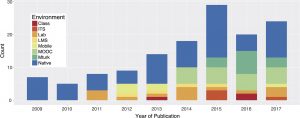Posts tagged geert-jan houben
Activating learning at scale: A review of innovations in online learning strategies
The Article “Activating learning at scale: A review of innovations in online learning strategies” was published in the journal Computer & Education.
Higlights
- A systematic review on scalable learning strategies was conducted.
- Results synthesize 126 studies including 132,428 participants.
- Large-scale experiments yield a far lower rate of positive results.
- Cooperative, gamified, and interactive learning strategies are the most effective.
Abstract
Making advantage of the vast history of theoretical and empirical findings in the learning literature we have inherited, this research offers a synthesis of prior findings in the domain of empirically evaluated active learning strategies in digital learning environments. The primary concern of the present study is to evaluate these findings with an eye towards scalable learning. Massive Open Online Courses (MOOCs) have emerged as the new way to reach the masses with educational materials, but so far they have failed to maintain learners’ attention over the long term. Even though we now understand how effective active learning principles are for learners, the current landscape of MOOC pedagogy too often allows for passivity — leading to the unsatisfactory performance experienced by many MOOC learners today. As a starting point to this research we took John Hattie’s seminal work from 2008 on learning strategies used to facilitate active learning. We considered research published between 2009 and 2017 that presents empirical evaluations of these learning strategies. Through our systematic search we found 126 papers meeting our criteria and categorized them according to Hattie’s learning strategies. We found large-scale experiments to be the most challenging environment for experimentation due to their size, heterogeneity of participants, and platform restrictions, and we identified the three most promising strategies for effectively leveraging learning at scale as Cooperative Learning, Simulations & Gaming, and Interactive Multimedia.
Keywords
Teaching/learning strategies, Adult learning, Evaluation of CAL systems, Interactive learning environments, Multimedia/hypermedia systems
Reference
Dan Davis, Guanliang Chen, Claudia Hauff, Geert-Jan Houben (2018) Activating learning at scale: A review of innovations in online learning strategies, Computers & Education, Volume 125, 2018, Pages 327-344, ISSN 0360-1315, https://doi.org/10.1016/j.compedu.2018.05.019.
Can Learners be Earners? Investigating a Design to Enable MOOC Learners to Apply their Skills and Earn Money in an Online Market Place
This article is published in the journal IEEE Transactions on Learning Technologies.
Abstract
Massive Open Online Courses (MOOCs) aim to educate the world. More often than not, however, MOOCs fall short of this goal — a majority of learners are already highly educated (with a Bachelor degree or more) and come from specific parts of the (developed) world. Learners from developing countries without a higher degree are underrepresented, though desired, in MOOCs. One reason for those learners to drop out of a course can be found in their financial realities and the subsequent limited amount of time they can dedicate to a course besides earning a living. If we could pay learners to take a MOOC, this hurdle would largely disappear. With MOOCS, this leads to the following fundamental challenge: How can learners be paid at scale? Ultimately, we envision a recommendation engine that recommends tasks from online market places such as Upwork or witmart to learners, that are relevant to the course content of the MOOC. In this manner, the learners learn and earn money. To investigate the feasibility of this vision, in this paper we explored to what extent (1) online market places contain tasks relevant to a specific MOOC, and (2) learners are able to solve real-world tasks correctly and with sufficient quality. Finally, based on our experimental design, we were also able to investigate the impact of real-world bonus tasks in a MOOC on the general learner population.
Reference
Guanliang Chen, Dan Davis, Markus Krause, Efthimia Aivaloglou, Claudia Hauff, Geert-Jan Houben, “Can Learners be Earners? Investigating a Design to Enable MOOC Learners to Apply their Skills and Earn Money in an Online Market Place”, IEEE Transactions on Learning Technologies, vol. , no. , pp. 1, 5555, doi:10.1109/TLT.2016.2614302

